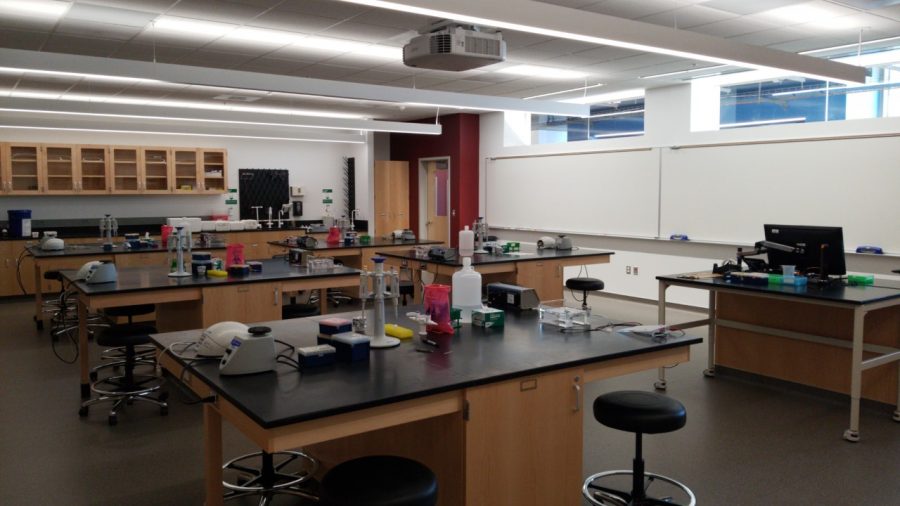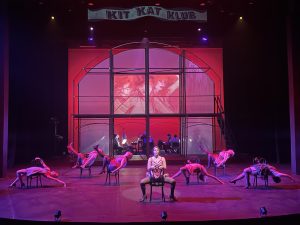UWL laboratory professors adapt to challenges of online learning
September 27, 2020
Laboratory-based courses at the University of Wisconsin-La Crosse were planned to operate in a fully virtual or hybrid learning format for the fall 2020 semester. These courses have routinely utilized physical lab spaces and instruments, but new technologies and an increased emphasis on data analysis techniques have made it possible for students to continue with laboratory classes online.
Prior to the start of fall 2020 courses, many professors chose to adapt lab courses to a hybrid format, allowing for a blend of both in-person instruction and remote learning. Since the shelter in place order issued on Sept. 13 by Chancellor Joe Gow, additional adjustments have been made to move all labs to completely virtual environments.
In an interview with The Racquet Press, associate professor of biology Jennifer Klein said she started planning for fully online courses in May. “I chose to be entirely online and to put a lot of effort into making a good experience. I think with planning, you can do pretty much anything.”
Lab courses typically use physical instruments in person. Klein made adjustments to her courses to ensure students still had access to those materials. “In advanced microscopy, students are supposed to learn how to use research-grade microscopes and become microscopists,” said Klein. “I didn’t want to lose that hands-on part of the course, so I actually purchased every student their own microscope that attaches to a smartphone.”
According to Klein, the DIPLE microscopes were found through a Kickstarter campaign and the batch received by her students was the very first manufactured by Italian biotech company SmartMicroOptics. The microscopes can achieve research-grade magnification and will be used to aid students in their independent research projects this semester, said Klein. Working with Mississippi Valley Conservancy, and an organic orchardist, students will analyze soil samples, water samples, apple structure, and various orchard pests.
Klein said industry representatives will be holding Zoom meetings with the students to demonstrate their microscopes and how to use them. “Those students will actually experience more advanced microscopy techniques than I’ve ever taught them in the past.” She said the meetings may also lead to additional professional benefits. “Every time we have a representative from biotechnology come in, it’s actually not uncommon for a student to land an interview,” said Klein.
Other professors have decided to use a hybrid course model to maximize their time in the physical lab spaces. Genetics lab professor Lee Baines explained that initially, each class would split into two cohort sections. The cohorts would rotate between one week of face-to-face lab and one week of virtual lab, he said. To meet guidelines of the recent shelter in place order, the course schedule was adjusted so all students could perform virtual labs.
Baines said that in virtual labs, there are techniques that students will not be able to fully experience as they would have in face-to-face instruction. “They’re missing running gels. They’re missing learning setting up a polymerase chain reaction. They are missing all of that. So we’ll be teaching them those things but physically they’re not doing it,” said Baines.
According to Baines, one of the biggest challenges of the transition from online instruction to in-person instruction has been an increase in workload. “All the instructors are working incredibly hard. And everybody’s really doing their best to pull things together. And I think, honestly, the faculty as an entity, the staff as an entity, has really done an amazing job and should be commended for that.”
Lab students have also been adjusting to online lab environments. UWL senior biology major Marc Rademaker said the instability of the semester is the most difficult aspect to manage so far. “Trying to predict what’s going to happen is like impossible.”
Rademaker said his microbiology professors have utilized virtual tutorials during online learning. “We were supposed to have a review on how to use microscopes and do gram staining, and so the instructors were actually able to find virtual tutorials for both of those things,” said Rademaker. “I still felt like I learned how to do those things even if I wasn’t physically doing them, which really helps.”
Rademaker says he appreciates the effort that his professors have put into the semester. “Transitioning to online, when we have such great lab programs, has been a struggle. But our professors, in my experience, have done a great job of adapting and still making it worthwhile for us.”






